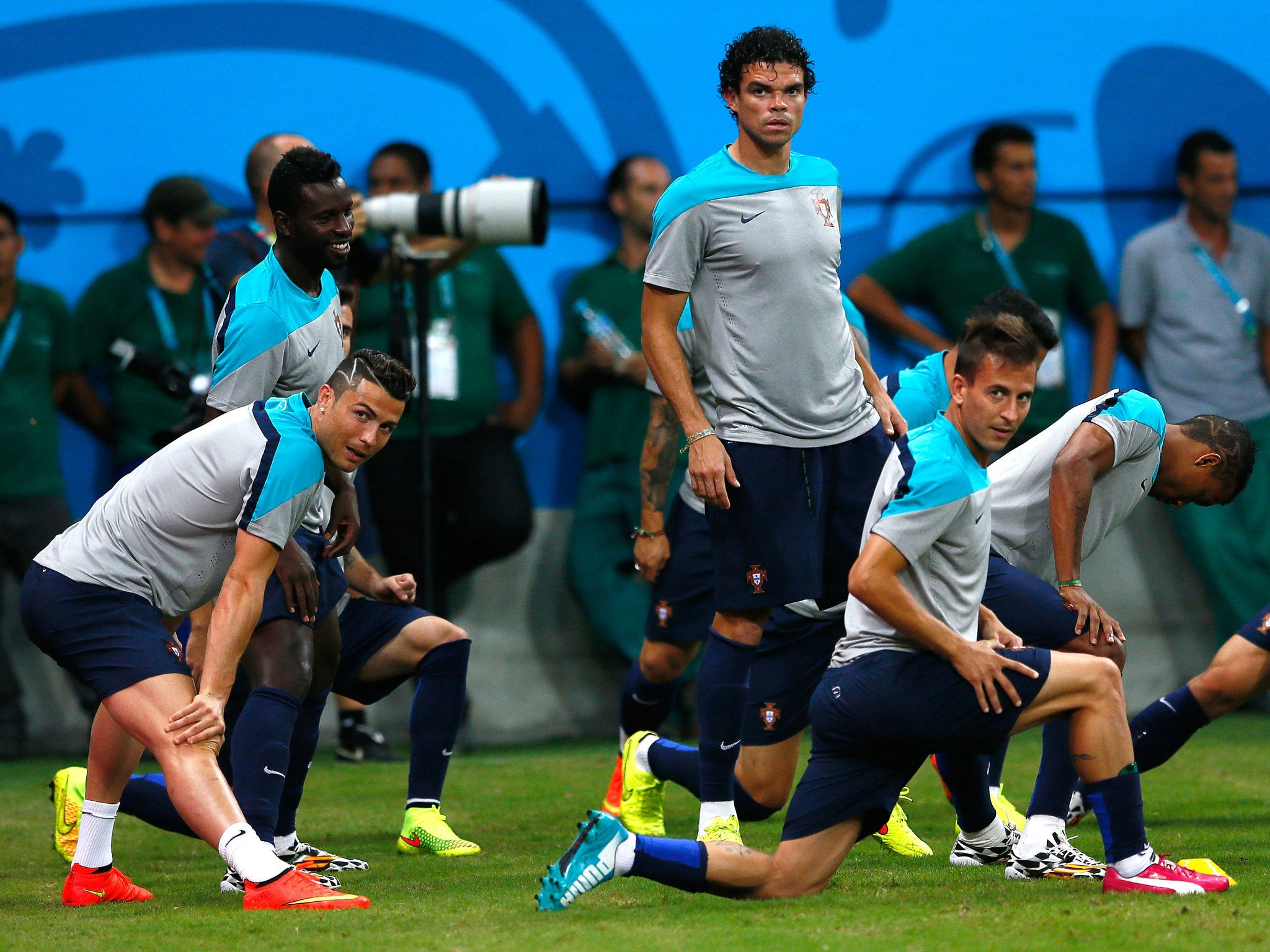World Cup 2014: Cristiano Ronaldo on brink despite Jurgen Klinsmann rejecting talk of carve-up
Ronaldo has played at this World Cup but with a country that no longer appears to have any prospect of winning it

At least, unlike Zlatan Ibrahimovic, Gareth Bale and Radamel Falcao, Cristiano Ronaldo has played at this World Cup. However, the World Player of the Year does so with a country that no longer appears to have any prospect of winning it.
While his great rival, Lionel Messi, and next-tier superstars such as Neymar, Robin van Persie and Mario Balotelli, can dream of triumph in the Maracana on 13 July Ronaldo will currently settle for hanging around in Brazil long enough to play a match fully fit.
That seems unlikely, and not just because his tendinosis injury appears a lingering one. Portugal, by dint of an injury-time cross from Ronaldo in Manaus on Sunday night so sumptuous even one of his hapless team-mates could not fail to convert, are still in the competition, but only just.
To reach the second stage they need to defeat Ghana in Brasilia on Thursday, hope Germany best United States in Recife at the same time, and achieve at least a five-goal swing in goal difference. Given the respective performances of Portugal and Ghana so far, the first requirement is unlikely. The second would appear more feasible, but it was quickly noted, after Portugal’s draw with the US late on Sunday, that a nice quiet draw would send both Germany and United States through to the second round.
Portuguese and Ghanaian concern at this scenario was exacerbated by the knowledge that there is a precedent, and it involved a German team. Infamously, in 1982 a 1-0 win for West Germany, in their final group match against Austria in Gijon, would send both sides through at the expense of Algeria, who had previously stunned the world by beating the Germans, but had by then completed their matches. West Germany began the match furiously and scored after 10 minutes. Thereafter the game descended into farce, with neither side making any effort to score. Michel Hidalgo, the French coach, scouting future opponents, did not make a note and suggested sarcastically the teams be given the Nobel Peace prize.
It became known as the Scandal of Gijon. It also led to a change in the way competitions are run, with decisive group games at championships since played simultaneously. However, scenarios where a particular result favours both teams still occur, notably at Euro 2004 where Scandinavian neighbours Denmark and Sweden played a 2-2 draw that put both through at Italy’s expense. The Italians were unhappy but there was no proof of collusion.
USA 2 Portugal 2 player ratings
Show all 22Adding fuel for conspiracy theorists is the knowledge that Joachim Löw, Germany’s coach, was previously their assistant under Jürgen Klinsmann, his compatriot, who now coaches the US. Klinsmann, though, was dismissive of suggestions the pair would cook the result. “You’re talking about a game that is decades away that is only part of the Germany history and not the United States,” he said. “The United States is known to give everything they have in every game. We have that fighting spirit.”
Klinsmann also dismissed the notion he and Löw would speak. “There’s no such call,” he said. “There’s no time right now to have friendship calls. It’s about business now.”
Several US players are of mixed German-American parentage but one of them, Jermaine Jones, who won three caps for Germany before switching allegiance, said playing for a draw was risky.
“You can have 0-0 or 1-1 close to the end, and then the ball goes in and you’re out,” he said. “So we don’t want that.”
US progress has led to an upsurge of interest in “soccer” in the States, which would increase further should the team go through. But fixing the result with Germany might put off new fans, while beating the multiple world champions would be a scalp. The US Soccer Federation president, Sunil Gulati, said playing for a point was inconceivable. “It’s not what this team or this coach is about,” he said.
Paulo Bento, Portugal’s coach, admitted he had other things to worry about. “At this moment we have to think about our own team, not think about what’s going to happen in another match with another team,” he said.
He certainly has plenty to ponder. In the wake of their last-gasp draw, which followed a 4-0 drubbing by Germany, the team were criticised for being over-dependent on Ronaldo, poorly prepared physically, choosing an inappropriate base, and failing to bring in young players. A radio station described Portugal’s performance as a “fiasco” and demanded a public explanation from the federation.
Perhaps, though, Ronaldo had the most accurate explanation. Portugal were semi-finalists in 2006 but now, he said sadly: “We’re probably just an average team. I’d be lying if I said we were a top team. We were never a favourite. I never thought I would be World Cup champion. We have to be humble and know what we’re capable of.”
Subscribe to Independent Premium to bookmark this article
Want to bookmark your favourite articles and stories to read or reference later? Start your Independent Premium subscription today.

Join our commenting forum
Join thought-provoking conversations, follow other Independent readers and see their replies